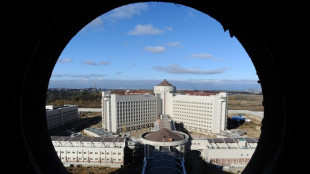
-
 France's agriculture show, an outlet for angry farmers
France's agriculture show, an outlet for angry farmers
-
China's EV maker XPeng eyes doubling global presence by year's end

-
 Germany on eve of elections under shadow of US-European rift
Germany on eve of elections under shadow of US-European rift
-
France still seeking to block EU-Mercosur trade deal: Macron

-
 Ukraine's earth riches are rare and difficult to reach
Ukraine's earth riches are rare and difficult to reach
-
On $15 a month, Venezuela's teachers live hand to mouth

-
 'See you in court': Trump, governor spar over trans rights
'See you in court': Trump, governor spar over trans rights
-
US stocks tumble on fears of slowdown

-
 Cuba opens solar park hoping to stave off blackouts
Cuba opens solar park hoping to stave off blackouts
-
German flying taxi start-up's rescue deal collapses

-
 Stock markets diverge, oil prices slide
Stock markets diverge, oil prices slide
-
'Queen of Pop' Madonna lambasts 'King' Trump

-
 Apple says halting data protection tool for UK users
Apple says halting data protection tool for UK users
-
Female chefs condemn sexism in British kitchens

-
 US, China economic leaders raise 'serious concerns' in first call
US, China economic leaders raise 'serious concerns' in first call
-
Russia sells famed imperial prison at auction

-
 Stock markets rise as Alibaba fuels Hong Kong tech rally
Stock markets rise as Alibaba fuels Hong Kong tech rally
-
France full-back Jaminet returns to rugby after racist video ban

-
 Chinese AI companies celebrate DeepSeek, shrug off global curbs
Chinese AI companies celebrate DeepSeek, shrug off global curbs
-
Asian markets advance as Alibaba fuels Hong Kong tech rally

-
 Nissan shares jump 11% on reported plan to seek Tesla investment
Nissan shares jump 11% on reported plan to seek Tesla investment
-
Trump aid cut imperils water scheme in scorching Pakistan city

-
 Just 17% of Japan citizens hold passport, data shows
Just 17% of Japan citizens hold passport, data shows
-
Most Asian markets rise as traders pick over week of headlines

-
 Japan's core inflation rate hits 19-month high
Japan's core inflation rate hits 19-month high
-
How a 'forgotten' Minnesota monastery inspired 'The Brutalist'

-
 Japan's core inflation rate hits 3.2% in January
Japan's core inflation rate hits 3.2% in January
-
Stocks mostly fall on tepid Walmart outlook, geopolitical worries

-
 Musk in X spat with Danish astronaut over 'abandoned' ISS crew
Musk in X spat with Danish astronaut over 'abandoned' ISS crew
-
Bond franchise shake-up moves spy into Amazon stable

-
 New York seeks hundreds of millions of dollars in 'vaping epidemic' case
New York seeks hundreds of millions of dollars in 'vaping epidemic' case
-
Moon or Mars? NASA's future at a crossroads under Trump

-
 Spotify adds more AI-generated audiobooks
Spotify adds more AI-generated audiobooks
-
Stocks in the red as investors worry about growth and inflation

-
 Bond franchise shifts to Amazon as Broccoli family steps back
Bond franchise shifts to Amazon as Broccoli family steps back
-
Unfair? Figures belie Trump's claims on EU trade balance

-
 Stock markets mostly lower on Fed concerns over Trump policies
Stock markets mostly lower on Fed concerns over Trump policies
-
France moves to ban marriage for undocumented migrants

-
 Walmart sales rise but shares tumble on forecast
Walmart sales rise but shares tumble on forecast
-
Spain court convicts ex-football chief for sexual assualt over forced kiss

-
 Mercedes-Benz flags cost cuts, tough year ahead after torrid 2024
Mercedes-Benz flags cost cuts, tough year ahead after torrid 2024
-
ECB rate hikes result in record loss in 2024

-
 Romanian director Jude shoots latest film in 10 days on an iPhone
Romanian director Jude shoots latest film in 10 days on an iPhone
-
Sri Lanka passenger train kills six elephants

-
 Stock markets mixed on Fed concern over Trump policies
Stock markets mixed on Fed concern over Trump policies
-
Birkenstock sandals are not art, German court rules

-
 Markets drop, gold hits record on Fed concern over Trump policies
Markets drop, gold hits record on Fed concern over Trump policies
-
Airbus profit climbs in 2024, aims to accelerate output

-
 Airbus proft climbs in 2024, aims to accelerate output
Airbus proft climbs in 2024, aims to accelerate output
-
Trump says trade deal with China 'possible'


On $15 a month, Venezuela's teachers live hand to mouth
With a monthly salary of $15, a teacher in Venezuela earns nowhere near enough to cover their basic food necessities, never mind rent or medicine.
Many in the crisis-stricken South American country are forced to work multiple jobs, or pool their money with family.
Thousands have emigrated in pursuit of greater financial stability.
"For the past two years, the situation has been horrible; you can't even buy shoes," 70-year-old Maria Cerezo, who has been a teacher in the public sector for 39 years, told AFP at a thrift shop in the capital Caracas.
She had just selected a blue nylon dress with white polka dots -- and a price tag of $2. She hid the garment behind other clothes for sale.
"I'll get it tomorrow, God willing, because I don't have the money today," Cerezo explained.
She remembers a time when a teacher would buy "clothes, shoes, electrical appliances" with their yearly bonus.
Nowadays, "it's not possible."
A basket of food essentials for a family of four in Venezuela costs about $500 a month, 33 times the salary of a teacher -- a profession that has historically been underpaid, but never as little as now.
Cerezo's family budget is augmented by the salaries of her daughter -- also a teacher -- and her husband, a lawyer.
- Role models -
An 80-percent drop in GDP over a decade of increasingly repressive rule by President Nicolas Maduro since 2013 has pushed more than eight million Venezuelans -- a quarter of the population -- to seek a better life elsewhere.
A public sector teacher's salary is not even among the lowest.
The minimum salary in Venezuela today is $2 a month, which the government supplements with subsidies.
In the private sector, the average monthly income is about $200.
Most public schools today operate only two or three days a week so that teachers can work additional jobs.
Some give private lessons, others drive taxis or sell crafts.
Venezuela's education system has a deficit of 200,000 teachers, according to the government, and enrolment of student teachers is down nearly 90 percent.
For those who remain in the profession, there is the El Ropero Solidario thrift store in Caracas, run by teacher Kethy Mendoza and supported by the Venezuelan Federation of Teachers.
Much of the merchandise comes from educators, who receive half of the sale price of an item of clothing -- which they can also opt to donate -- while the other half keeps the shop running.
"We are role models for the children," Mendoza, 64, explained of the endeavor, which also aims to help teachers in need of medicines, food and emergency hospital care.
"If we go to school poorly dressed because the economic crisis doesn't allow us to buy a change of clothes or decent shoes, how can we expect of the pupils to come dressed properly, presentable?"
Maduro, who claimed victory in July 2024 elections that the opposition and much of the international community says he stole, insists low salaries are a consequence of international sanctions.
Experts point to economic mismanagement and corruption in the oil-rich former petro state as other factors.
Y.Jeong--CPN
